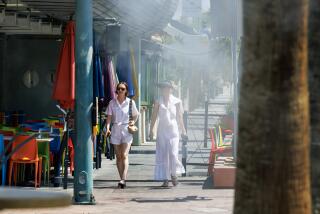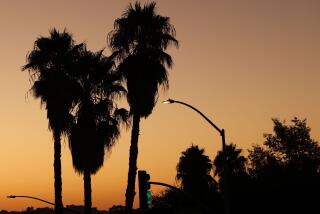March sizzled, breaking or tying records in much of the country
In one of the hottest Marches on record, more than 7,700 high-temperature marks were tied or broken in many parts of the county, according to data from the National Oceanic and Atmospheric Administration.
But does that mean people should break into a sweat about global warming or worry about even hotter conditions as the United States heads into summer?
Not so fast, NOAA research meteorologist Martin Hoerling suggests in his assessment after taking a first look at the information.
According to his findings, the heat wave was essentially a random event that can be explained by studying the usual physical processes that determine weather, rather than blamed on a bigger cause such as global warming.
“This isn’t to say global warming isn’t a phenomenon; it is. It is not to say the planet isn’t warming; it is,” Hoerling said in a telephone interview on Monday. “It is to put into context how variable weather can be.”
Hoerling’s assessment has not yet been reviewed by scientific peers.
According to NOAA, of a possible 174,739 records, 6,182 were shattered and 1,551 were tied around the country. Record temperatures were 35 degrees above normal and about 18 degrees warmer than usual in about two-thirds of the country.
Hoerling asserts that the heat was caused by warm winds that sent air through the country from the Gulf of Mexico. Wind patterns, low in the Northwest and high in New England, trapped the warm air from the gulf.
Chicago, which doesn’t usually hit 80 until around the Fourth of July, had nine consecutive record hot days in March, eight of them over 80 degrees.
Hoerling compares March 2012 to the heat waves of 1910, which he said also seem to be a random weather event rather than tied to any specific global warming phenomenon.
With temperatures running above normal, the question becomes whether July fry rather than just sizzle. Hoerling said it usually doesn’t work that way.
ALSO:
Trayvon Martin case prompts protest T-shirt subculture
Credit card processing company explains security breach
Genealogists, fire up your computer: The 1940 census is online
More to Read
Sign up for Essential California
The most important California stories and recommendations in your inbox every morning.
You may occasionally receive promotional content from the Los Angeles Times.











